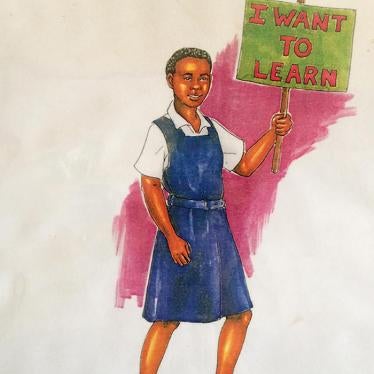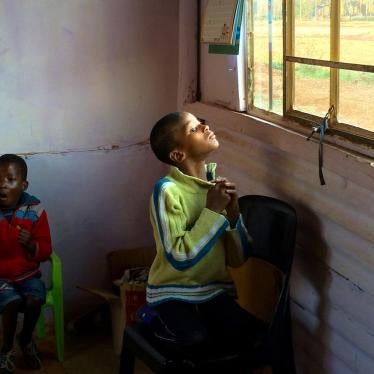Human Rights Watch welcomes the opportunity to submit evidence to the Portfolio Committee on Basic Education for its meeting on inclusive education on May 30, 2017. Through this submission, Human Rights Watch would like to share relevant information on children with disabilities and inclusive education from South Africa’s reviews by United Nations inter-governmental and expert bodies in 2016 and 2017.
In August 2015, Human Rights Watch released our report “Complicit in Exclusion”: South Africa’s Failure to Guarantee Inclusive Education for Children with Disabilities,” documenting barriers to inclusive, quality education for children with disabilities in South Africa.[1] Dewa Mavhinga, Senior Africa Researcher, presented our findings and key recommendations to the Portfolio Committee in March 2016.[2]
We acknowledge progress made by the Department of Basic Education with regards to the progressive provision of resources for learners who are blind or have low vision. Furthermore, we note that the Screening, Identification, Assessment and Support (SIAS) policy is being progressively implemented with a view to full implementation by 2019. However, our findings indicate that insufficient resources and qualified personnel mean the policy is not being implemented consistently everywhere, particularly in rural areas and under-resourced townships.[3]
Human Rights Watch has found that many of the barriers identified in our 2015 report persist, including: very long referrals to special schools and lengthy waiting lists, school fees and additional school-related costs, and severe transportation issues. Hundreds of thousands of children with disabilities are excluded from education across the country. Instead, these children should enjoy equality throughout their education, including by having meaningful choices and opportunities to be accommodated in mainstream schools, and to receive quality education on an equal basis with, and alongside, children without disabilities.
The Department of Basic Education does not appear to have produced accurate data that reflects current numbers of children with disabilities who remain out of school, and continues to rely on estimates and outdated data. We have also found that the government continues to prioritize funding for special schools, to the detriment of inclusive education.[4]
The International Covenant on Economic, Social and Cultural Rights (ICESCR) entered into force in South Africa on April 12, 2015.[5] Under article 14, states which have not yet achieved free, compulsory primary education undertake to work out and adopt a detailed plan of action for the implementation of free compulsory primary education within two years of ratifying the treaty.[6] The plan should also fix a date, within the span of a reasonable number of years, to achieve this treaty’s guarantee of compulsory education free of charge for all. To date, the South African government has yet to fulfil this obligation. As documented in our research, public schools are not automatically free of charge. Most children with disabilities are obliged to pay fees to attend special schools, in addition to other costs, such as uniforms, food, transport, and special assistants to help them in the classroom. Fees in special schools typically range from R350-R750 (US$32-$68) per term. In many cases, parents reported not having access to fee waivers. As a result, hundreds of thousands of children with disabilities in South Africa cannot afford to attend school. [7]
In September 2016, the United Nations Committee on the Rights of the Child reviewed South Africa’s compliance with the Convention on the Rights of the Child.[8] In its review, the Committee expressed its concern at the multiple layers of discrimination and exclusion faced by the majority of children with disabilities, as well as at “the lack of: accurate and comprehensive data on children with disabilities; a comprehensive law and policy to realize the rights of children with disabilities, with clear baselines, a clear time frame and measurable indicators for the implementation, and mechanisms for monitoring implementation; effective multisectoral coordination within the Government, in particular in rural areas, to provide integrated services to children with disabilities; and effective provision of reasonable accommodation, such as through the provision of assistive devices and of services in Braille and in sign languages.”[9]
In its concluding observations, the Committee raised several concerns, including the large number of children with disabilities out of school or in special schools or classes, the lack of legislation guaranteeing the right to inclusive basic education for all children with disabilities, the ineffective implementation of relevant policies due to acute shortages of qualified staff, and insufficient allocations of financial resources. The low quality of education and inadequate curriculum for children with disabilities was also raised, particularly in terms of preparing children for further education, employment, and an independent life. The Committee also highlighted concerns about the failure to provide free, compulsory primary education to children with disabilities, and about discrimination and violence by teachers and other students against children with disabilities.[10]
The Committee made the following recommendations to the South African government:
- “Review Education White Paper 6: Special Needs Education: Building an Inclusive Education and Training System, of 2001, with a view to further developing a legal and policy framework for inclusive education, and to prioritizing the expansion of full service schools and the inclusion of children with disabilities in mainstream classes of mainstream schools;
- Allocate sufficient technical, human and financial resources for inclusive education, including the funding necessary for guaranteeing the provision of reasonable accommodation;
- Ensure free, compulsory primary education to all children with disabilities, provide reasonable accommodation, including personal assistants, at mainstream schools, free of charge, and prioritize enrolment in a school near to where the child concerned lives in order to avoid costly transport and boarding arrangements;
- Develop curricula and learning and teaching materials that facilitate respect for and the dignity and inclusion of children with disabilities in order to raise the awareness of teachers and students so as to eliminate stigmatization of children with disabilities and prejudice against them; and
- Improve the quality, adequacy and adaptability of education provided to children with disabilities, in order to facilitate their fullest possible social integration and individual development.”[11]
In May 2017, South Africa’s human rights record was also reviewed by the United Nations Human Rights Council.[12] During the review, South Africa was asked about access to inclusive education for children with disabilities. The draft report of the Working Group, dated May 12, 2017, contains two recommendations from Australia and Israel to implement the right to inclusive education of children with disabilities.[13] The South African government has until the thirty-sixth session of the Human Rights Council in September 2017 to respond to the recommendations.
Recommendations
Human Rights Watch recommends that the Portfolio Committee on Basic Education should:
- Urge the Department of Basic Education and the Department of Social Development to work together to publish accurate and transparent data on the number of children with disabilities who are out of school, those who are on waiting lists for special schools, and those who have dropped out.
- Call on the government to comply with its fundamental obligations on the right to education, particularly its obligation to make primary education free and compulsory for all students, including developing a detailed plan of action for the progressive implementation of free compulsory primary education within a set numbers of years, in line with its obligations under the International Covenant on Economic, Social and Cultural Rights.
- Urge the government to adopt strong Norms and Standards for funding of inclusive education to ensure public special schools are adequately funded, and they qualify as “no fee schools.” Prohibit all public ordinary schools from imposing financial conditions on children with disabilities that children without disabilities would not incur, such as transportation, which impose undue financial barriers on children who do not access neighborhood schools.
- Urge the Department of Basic Education to adopt stronger legal protections for children with disabilities to complement the South African Schools Act. This includes a clear duty to provide reasonable accommodation in public ordinary schools, accompanied by specific provisions that prevent the rejection of learners with disabilities from schools in their neighborhood. This should apply at all school levels, in transportation and other essential services.
- Encourage the Department of Basic Education to adopt clear mechanisms to ensure department officials remain in control of enrollment decisions, to challenge unnecessary referrals to special schools and monitor sudden drop outs of learners with disabilities.
- Urge the Department of Basic Education to adopt a weighting system, the method used to calculate a maximum student-to-teacher ratio per classroom, weighted according to the type of disability—in ordinary and full-service schools to ensure teachers are able to dedicate sufficient attention to every learner requiring additional support to overcome learning barriers.
- Request further information and evidence from the Department of Basic Education on how children with disabilities are supported to follow the curriculum taught in mainstream classrooms, as well as data on the numbers of children with disabilities following and being tested on the same curriculum taught in ordinary schools.
- Implement the recommendations from the UN Committee on the Rights of the Child.
- Encourage the Department of International Relations and Cooperation to accept all recommendations made, concerning education and inclusive education of children with disabilities, during the United Nation’s Universal Periodic Review.
[1] Human Rights Watch, “Complicit in Exclusion”: South Africa’s Failure to Guarantee Inclusive Education for Children with Disabilities, August 2016, https://www.hrw.org/report/2015/08/18/complicit-exclusion/south-africas-failure-guarantee-inclusive-education-children.
[2] Human Rights Watch Statement to Portfolio Committee on Basic Education, South Africa, Presentation delivered by Dewa Mavhinga, Senior Researcher, Africa Division, March 8, 2016, https://www.hrw.org/news/2016/03/08/human-rights-watch-statement-portfolio-committee-basic-education-south-africa.
[3] “South Africa: Little Progress for Youth With Disabilities, Government Should Keep Promise to Open School Doors,” Human Rights Watch news release, August 19, 2016, https://www.hrw.org/news/2016/08/19/south-africa-little-progress-youth-disabilities.
[4] Ibid.
[5] International Covenant on Economic, Social and Cultural Rights (ICESCR), adopted December 16, 1966, G.A. Res. 2200A (XXI), 21 U.N. GAOR Supp. (No. 16) at 49, U.N. Doc. A/6316 (1966), 993 U.N.T.S. 3, entered into force in April 2015.
[6] ICESCR, art. 14.
[7] Ibid, Human Rights Watch, “Complicit in Exclusion.”
[8] Human Rights Watch submission to the Committee on the Rights of the Child regarding South Africa, February 1, 2016, https://www.hrw.org/news/2016/02/01/human-rights-watch-submission-committee-rights-child-regarding-south-africa; Elin Martínez, “South African Official Brushes Off Children with Disabilities, The Government Should Guarantee Their Equal Right to Education,” Human Rights Watch dispatch, September 21, 2016, https://www.hrw.org/news/2016/09/21/south-african-official-brushes-children-disabilities.
[9] UN Committee on the Rights of the Child, “Concluding observations on the second periodic report of
South Africa,” October 27, 2016, CRC/C/ZAF/CO/2, http://tbinternet.ohchr.org/_layouts/treatybodyexternal/Download.aspx?symbolno=CRC%2fC%2fZAF%2fCO%2f2&Lang=en (accessed May 24, 2017), para. 43 (a) – (d).
[10] Ibid, para. 45 (a) – ( f).
[11] Ibid, para. 46 (a) – (e).
[12] “Human Rights Watch Submission to the Universal Periodic Review of South Africa,” September 2016, https://www.hrw.org/news/2017/05/05/human-rights-watch-submission-universal-periodic-review-south-africa. For more information, please see “Universal Periodic Review – South Africa,” http://www.ohchr.org/EN/HRBodies/UPR/Pages/ZAIndex.aspx
[13] United Nations Human Rights Council, “Draft report of the Working Group on the Universal Periodic Review: South Africa,” A/HRC/WG.6/27/L.14, May 12, 2017, https://www.upr-info.org/sites/default/files/document/south_africa/session_27_-_may_2017/a_hrc_wg.6_27_l.14.pdf (accessed May 23, 2017), recommendations 6.187 andf 6.188.








